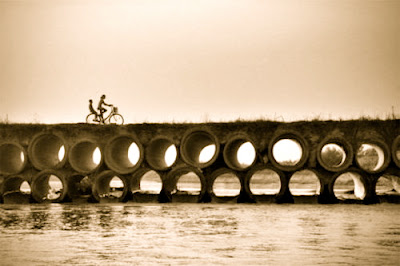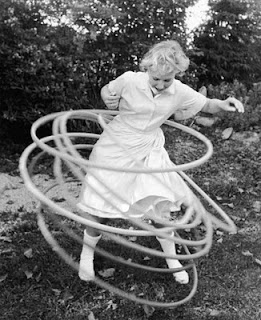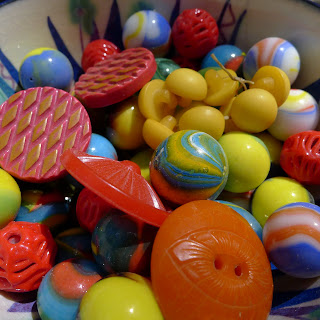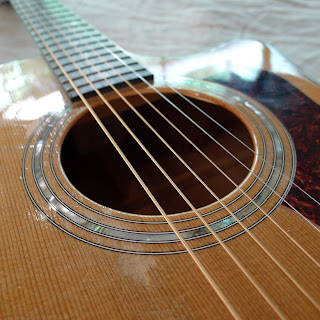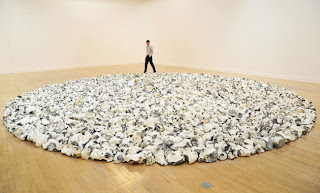I've been thinking about circles a lot lately...they seem to be everywhere. I guess it just depends what you focus on, and once you start looking for something it's all you see. Circles evoke both mysterious, eternal ideas... the universe, motion, cycles without beginning or end, the sun and the moon, as well as silly and joyful things like polka dots, bubbles, and juggling balls. It's the shape of the ball of earth we live on. The perfect symmetry of the shape is subliminally satisfying.
Above: Photo of Winter Horsetail stem enlarged 30 times, by Karl Blossfeldt published 1928
Above: Bridge made of concrete tubes
Vanessa Bell's fabric (this is a piece re-issued by Laura Ashley a number of years ago) with a ball motif she used often in her designs, inspired circles I'm painting on the walls in a room I'm designing at the Good Shepherd Center for Homeless Women and Children.
Above: A cupboard Vanessa Bell painted in her bedroom at Charleston, 1917
Above: Book cover designed by Vanessa Bell for her sister, Virginia Woolf.
Above: Vanessa Bell and Duncan Grant designed this table and chairs for Virginia Woolf.
Above: Sri Yantra Painting, Rajasthan, late 18th century. From "Tantra Art" by Ajit Mookerjee
Above: Judy Ledgerwood, Detail of Tyrian Rose, 2008
Above: Judy Ledgerwood "Rainwashed" 2008
Above: John Baldessari "Two Opponents (Blue and Yellow)" 2004
Above: John Baldessari "Studio" 1988
Above: John Baldessari poster for the band New Order
Above: Photo by Eddie Hausner, "Hula Hoop Craze"
Above: When I was growing up some of my dad's students at Boston University started a commune called "Total Loss Farm". We used to visit sometimes...this book has pictures taken there.
Above: Marcel Duchamp with his piece "Bicycle Wheel", the first of his "ready-made" pieces, from 1913. He said about this piece "To see that wheel turning was very soothing, very comforting, a sort of opening of the avenues onto other things than the material life of every day. I liked the idea of having a bicycle wheel in my studio. I enjoyed looking at it just as I enjoy looking at the flames dancing in a fireplace."
When I mentioned working on a circle post, a friend pointed out that without circles there would be no leisure. The extra time created by wheels on carts, becoming tires, becoming wheels on planes allowed us to have time to relax.
Above: In Todos Santos old tires made into colorful playground equipment.
Above: White wall tires
Above: Bathing attire designed by Sonia Delauney. This photo is on view in her show at the Cooper-Hewitt Museum in NY till June 19th
Above: Marimekko "Klaava" nightgown, 1975, designed by Annika Rimala
Above:Patti Boyd and Celia Hammond wearing Capsule Line felt helmets designed by Edward Mann, 1965. Photo by John French.
Above: Sketch by Bonnard in his notebook
Above: Photo by Tim Walker for Vogue Italia
Above: Chris Ofili, "Afro Margin Eight", 2007, from his show at David Zwirner Gallery fall 2009
Above: Judy Ledgerwood, Detail from "Black Tears" 2001
Above: Mathieu Mategot Panama Chair, 1953, perforated metal
Above: Mathieu Mategot Santiago Collection magazine holder. The Santiago Collection, designed in 1954, used metal slats perforated like the edge of film.
Above: Mathieu Mategot designed this fixture, the Rigiband Ceiling Light in 1954. It was a precurser to the Santiago Collection. It makes a wonderful pattern on the wall and ceiling.
Above: Little Dot had a similar idea about creating patterns on the wall. She painted polka dots on a light bulb to great effect!
Above: Artist Nick Cave's "Sound Suit"
Above: Polka dot tree in La Paz, Baja California...the happy girl is my daughter, quite a few years ago.
Above: Installations by Yayoi Kusama
Above and below: Marimekko "Kivet" pattern, 1956, designed by Maija Isola
Above: Knoll Ad for Saarinen Chair
Above: Alexander Calder "Hanging Apricot" Mobile
Above: This fantastic place is Barton's Bobonniere designed by Alvin Lustig (famous for his book designs) and Victor Gruen, who is known for having invented the modern mall.
Above: Light fixture detail from Barton's
Above: Vasily Kandinsky, Several Circles, 1926, collection Guggenheim Museum. Kandinsky is quoted saying that “ the circle is the synthesis of the greatest oppositions. It combines the concentric and the eccentric in a single form and in equilibrium. Of the three primary forms, it points most clearly to the fourth dimension.”
Above: Poster for a Sonia Delaunay exhibit
Above: Sonia Delaunay "Rhythme Colore", 1946. This is on view at the Cooper Hewitt in the show "Color Moves: Art and Fashion by Sonia Delaunay" till June 19th 2011.
Above: Drawings by Sonia Delaunay for bathing suit designs
Above: Marbles, beads, and buttons I've collected
Above: Stereo band graphic
Above: Japanese caligraphy which includes colored circles.
Above: Painting by Beatriz Milhazes
Above: Window installation by Beatriz Milhazes, as part of her survey exhibition at the Estacao Pinacoteca, Sao Paolo, Brazil, in 2008.
Above: photo by Mike Slack
Above: Photo by Uta Barth
Above: Donald Sultan "Smoke Rings February 14th 2001"
Above: Adam Fuss "Ark" 2005 silver gelatin print photogram. Fuss makes his photograms by using only light sensitive paper and a light source casting shadows or reflections on the support surface. This can be done in sunlight, or with artificial light. In this photogram the paper is submersed in water and picks up ripples in the water directly, not through a negative.
Above: Ring around the moon
Above: Ruth Asawa in front of her work, 1954
Above: Things we found on the beach...marbles, balls, and round rubber pieces.
Above: Joseph Cornell, "Sun Box", 1956
Above: Jean Tinguely and Yves Klein
Above: By Jean Tinguely, 1954
Above: By Jean Tinguely, this machine draws.
Above: By Jean Tinguely, this machine, "Homage to New York", 1960, was designed to self destruct.
Above: Spinning wheels turned wool into yarn, and round bobbins and spools hold thread for sewing machines. These vintage bobbins are from the blog "A Collection a Day"...this is day 24.
Above: Vintage buttons
Above: Julia Child's famous peg board where she hung her pots and pans. Their places are all marked.
Above: Maira Kalman included her late husband Tibor's collection of onion rings in her retrospective.
Above: Gordon Matta-Clark, from his Whitney retrospective "You Are The Measure", 2007.
Above: Two passengers on the German ocean liner MS St. Louis. "The Voyage of the Damned" was based on their terribly sad true story... a ship full of German Jewish refugees trying to find a country that would accept them in 1939.
Above: A round opening at Arcosanti, the utopian town in Arizona designed by Italian architect Paolo Soleri. I spent a summer there working on the project. Soleri believed in creating mixed use multi story structures to live and work in, leaving lots of open land all around, instead of single family houses taking a much greater amount of acreage per person.
Above: The area at Arcosanti where the Soleri bells are made.
Above: The opening at the top of the Pantheon
Above: Japanese Roof tiles
Above: The Maritime Hotel, NY, which was originally designed for the Maritime Union in the late 1960s with a porthole window theme.
Above: A room at the Maritime Hotel.
Above: Strange effect... I think this is a mirror hung on a cement wall.
Above: Jean Prouve in front of steel doors with porthole type windows. He used these doors n his own house, as well as in the Maison Tropicales shown below.
Above: Detail of Prouve's home
Above: One of three prefab homes Jean Prouve designed for use in Niger. The design was called "Maison Tropicale", and it was meant to withstand scorching heat, tropical rain, tornadoes and even gunfire, but when the prefabricated homes were offered to the French bureaucrats living in the West African colony of Niger in the late 1940s only three were purchased. The idea of living under a metal roof in extreme heat may not have seemed desirable, and they were expensive to build, but they are beautiful. In 2007 Christie's auctioned one of the three, and it was purchased for about five million dollars in 2007.
Above: Here it is on view in NY, in Long Island City, next to the Queensboro Bridge.
Above: A view of the interior of the "Maison Tropicale"
Above: The walkway around the house
Above: There is something so appealing about the pattern of circles created by the dryer fronts in laundromats, not to mention the memory of warmth and comforting clean smells. Photo by Amber Miller
Above: Round Streamline Moderne diner
Above: Kenneth Noland, Circle, 1998
Above: Damien Hirst, "Valium" 2000
Above: Robert Irwin untitled disc painting, 1968, collection MOMA. There are four lights shining on the disc creating the shadows around it.
Above: Kenneth Noland "Brass Sound" 1962
Above: A promotional sticker for my brother, Josh Clayton-Felt's album, "Inarticulate Nature Boy" on A&M. It was designed by Laramie Garcia.
Above: The round opening in my brother's guitar
Above: This is where the name of this blog came from...a favorite record by the Incredible String Band...see track 3. From cylinders to albums to CDs all music seems to be recorded on circles. Even tapes wind around on circular spindles.
Above: "Jyoti", or "Light" Tempera painting in gold. Deccani school, 18th century. From Tantra Art, by Ajit Mookerjee
Above: Michiel Jansz van Miereveldt, "Portrait of a Woman"(1628) wearing a ruff.
Above: Sol LeWitt "Wall Drawing 462" at Mass MoCA. this exhibit will be up for 25 years. "Wall Drawing Retrospective" includes 105 of LeWitt's large scale wall drawings from 1969-2007. Mass MoCA is housed in a set of old factory buildings, and seeing this span of work all together, in this space, is really worth a visit.
Above: Redwood tree rings
Above: Stacked wood bowls
Above: Artwork at Kettles Yard, Cambridge, England. I think the artist is Ben Nicholson.
Above Martin Puryear, untitled, 1981-2, painted Poderosa Pine, 58" diameter
Above: Painting detail by Pieter Bruegel the elder, 1560
Above: Boys rolling bicycle rim hoops in Toronto, 1922
Above: Neon by The Cyrcle, known for the songs "Turn Down Day" and "Red Rubber Ball".
Above: Sandro Botticelli, Tondo of Madonna and Child 1481-1483
Above: Ulrich Ruckriem marking circles
Above: Richard Long, "Nomad Circle", Mongolia 1996
Above: Richard Long, "Touareg Circle", The Sahara, 1988
Above: Richard Long, "Norfolk Flint Circle"
Above: Seahenge, a prehistoric monument discovered in 1998, is probably 4,000 years old. It was excavated, and moved to an environment where it could be protected, to the dismay of many. In the center is a large inverted oak stump, surrounded by 55 split oak trunks with the bark facing out.
Above: Stonehenge


